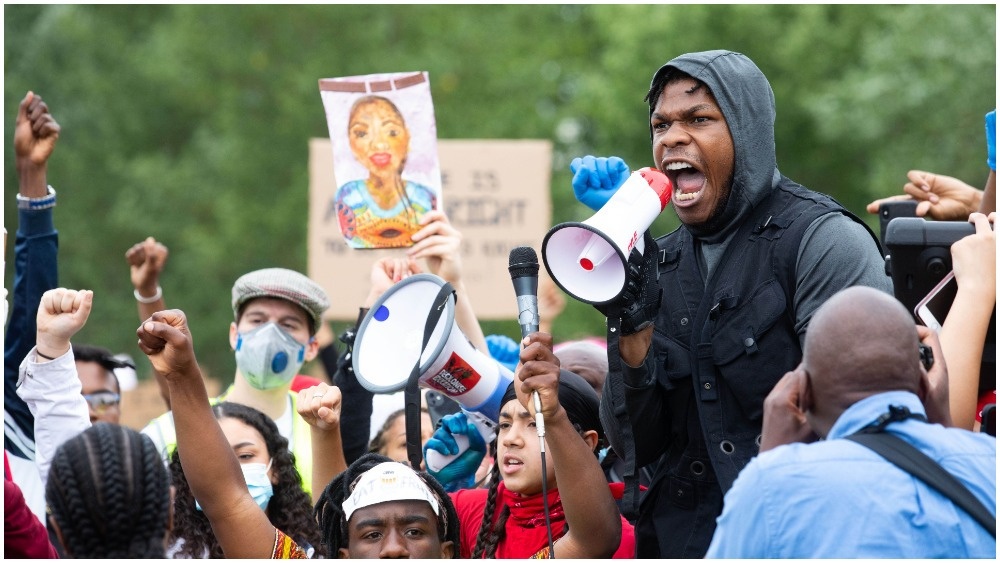“Look, I don’t know if I’m going to have a career after this, but fuck that.” John Boyega’s speech at the Black Lives Matter protest earlier this year was powerful, ferocious and irrevocably moving. A speech that should not threaten the stability of a career that is already established and successful – yet, for the 28-year-old British-Nigerian, the worry was inevitable.
As a Black actor in an industry that consistently shows its racism, it’s perhaps no surprise that the actor feels this concern linger over him – but that hasn’t stopped him from speaking out. In a recent interview with GQ, Boyega opened up about how Disney treated him when it came to the Star Wars franchise, imploring the conglomerate not to “bring out a black character, market them to be much more important in the franchise than they are and then have them pushed to the side.”
Although Boyega’s performance in Star Wars was largely critically acclaimed, when the trailer for The Force Awakens was released back in 2015, the actor found himself faced with trolls calling to boycott the franchise, purely because of his race. The backlash Boyega received for his role was instantly relentless – especially compared with his white co-stars. Disney themselves only made things harder.
The selection of trailers released for The Force Awakens seemed primed to position Boyega’s character Finn as the next Jedi, with equal stead for his character and Daisy Ridley’s Rey. Throughout the sequel trilogy, it became increasingly clear that there was no intention of giving him any significance of that sort – Finn, along with other characters played by people of colour, was quickly sidelined, often micro aggressively treated as a joke within the franchise. This visible promotion of Finn enticed a wider audience to the films, under the illusion that they would receive representation that is sorely lacking from sci-fi. Boyega is a phenomenal actor, and the failure to fulfil the potential he had in the role is frankly not good enough.

It is clear that his presence in the franchise was tokenistic; a means of increasing sales and ticking diversity of their checklist. It is completely performative, but does that come as a surprise? Over the last few years, there has been a call for more diverse casts in Hollywood, and rightfully so. Nevertheless, racial representation continues to fall short – placing Black actors in side character roles or not at all, Boyega’s Finn is unfortunately not an anomaly.
More recently, Boyega has been subject to a different controversy involving Jo Malone. Appointed as the brand’s first male global ambassador last year, he wrote, directed and starred in a short video ad for them. The brand replaced his campaign in China with a similar video with the same concepts that he created, substituting him with a local brand ambassador instead. This blatant disregard for Boyega’s work and effort is atrocious, causing the actor to step down from his position with the brand. It is an erasure of both his own ideas and his culture and history – the Chinese ad is completely identical, so the lack of credit for Boyega is astounding.
林于峻
It does, however, speak a lot to the consumption of Black art in its many forms. It is everywhere, as is its influence – yet it never receives the credit it deserves. You only need to take one look at music, and it is almost guaranteed that you will spot the echoes of Black culture and history defining what we listen to daily (often intensely white-washed, of course). Trends in makeup and fashion too stem from Black culture with no acknowledgement. Mainstream culture owes so much of itself to Black culture and there is a desperate need for appreciation of this, not just appropriation.
John Boyega has illuminated himself as an important voice in this battle, and one we need to lift up. Ultimately, Black creatives deserve better – the masses of talent need to be recognised and acknowledged, rather than ignored. There is systemic racism in the creative industry, and with actors like John Boyega risking their entire careers to speak up against it, we need to listen to their voices and support their work as best as we can.
Image Credit: Variety

